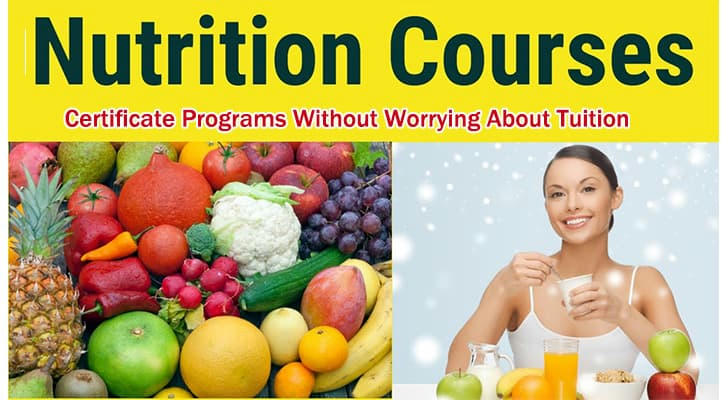Step-by-Step Guide to Earning a Nutrition Certification Online Without Tuition Concerns
Looking to advance your knowledge in health and wellness without worrying about tuition? Today’s digital platforms offer accessible nutrition certification options designed for learners who want to upskill without the burden of financial commitment. Whether you aim to pursue a nutrition diploma online, explore academic-style programs, or enhance your skills as a future nutrition coach, this guide outlines clear steps and credible resources to help you get started.

Why Consider a Nutrition Certification Online?
With increasing awareness around healthy lifestyles and disease prevention, nutrition-related careers are in high demand. Online certification programs provide flexible learning pathways that allow you to gain practical knowledge, improve your résumé, or even pivot to a new career—without the need to enroll in a costly university program. These opportunities are ideal for:
● Aspiring nutrition coaches seeking practical training
● Health-conscious individuals looking to deepen their understanding
● Professionals aiming to enhance their credentials in wellness industries
1. Identify Your Learning Goals
Before enrolling in any online program, define what you hope to achieve. Your goal will help you select the most relevant certification or course structure:
● For coaching: Consider platforms offering nutrition coaching content
● For academic growth: Look for diploma-level or university-affiliated content
● For general wellness knowledge: Choose structured short courses
2. Explore Platforms Offering Public Learning Options
Several educational providers allow learners to access nutrition training without upfront fees worries. You can study comprehensive content and often receive certificates, with optional costs only for official documentation or additional services.
Top platforms to consider:
● Coursera: Offers courses from major universities. Study modes often allow learners to audit content, with financial assistance available for certificates.
● edX: Features university-level modules in dietetics, human health, and wellness. You can explore the course content freely and later decide if certification is needed.
● Alison: Known for its extensive catalog of nutrition and health science courses, including diploma-level learning. Certificates are optional.
● OpenLearn (Open University): Provides accessible courses with a focus on practical knowledge. Statements of participation are available after completion.
3. Assess Course Content and Learning Outcomes
Choosing the right course involves more than just platform reputation. Make sure the course provides in-depth, structured material that supports your goals.
Key topics to look for include:
● Principles of human nutrition and digestion
● Macronutrients and micronutrients
● Public health and diet planning
● Client communication and wellness coaching skills
Checklist to evaluate programs:
● Does it offer proof of completion or a certificate?
● Is it aligned with your professional goals?
● Is the course designed or endorsed by recognized institutions?
4. Enroll and Start Learning
After identifying the best fit, create an account and enroll through your selected platform. Most programs allow you to begin instantly or within a few days.
Steps to enroll:
● Register on platforms like Coursera, edX, Alison, or OpenLearn
● Search using keywords such as "nutrition," "health coaching," or "dietetics"
● Choose study paths that indicate "audit available" or "start now"
● Begin your learning journey—without worrying about tuition
5. Structure Your Study Time
Many online nutrition programs are self-paced, which gives flexibility—but also requires self-discipline. To stay consistent:
● Set weekly goals (e.g., two modules per week)
● Allocate regular study hours (e.g., 1 hour/day)
● Use course forums or online groups to engage with peers
6. Complete Evaluations and Earn Recognition
Courses typically involve video lectures, interactive quizzes, and assignments. Completion requirements vary but often include:
● Watching all core modules
● Passing quizzes or a final assessment
● Meeting minimum achievement standards (usually 80% or above)
Upon successful completion, many platforms provide a downloadable certificate or completion proof—often with an optional fee if you want official documentation.
7. Pursue Advanced Learning Pathways
For those aiming to build toward degree-level knowledge, consider combining multiple certifications or enrolling in structured pathways.
Options include:
● Micro-credentials or specializations that stack into recognized qualifications
● Online diplomas from platforms like Alison or edX
● University-led course series with long-term access and recognized certificates
8. Stay Informed and Connected
Maintaining your professional development is just as important as earning a certificate. Stay updated by:
● Subscribing to nutrition science newsletters or blogs
● Following academic institutions and wellness experts online
● Joining forums or professional groups related to nutrition and wellness
9. Use Your Certification Strategically
Once certified, update your résumé, LinkedIn profile, and professional documents. Highlight new skills and competencies that demonstrate your commitment to lifelong learning. Consider these paths:
● Apply for jobs in wellness centers, gyms, or community health projects
● Start a small business as a nutrition advisor or health coach (check local regulations)
● Continue studying to reach more advanced academic levels
10. Common Questions About Online Nutrition Certifications
Are these certifications useful for career development?
Absolutely—many employers recognize self-driven education, especially if courses come from respected institutions. However, check local licensing requirements if you plan to work clinically.
What’s the difference between a diploma and a degree?
A diploma generally covers practical skills in a shorter timeframe. A degree involves a more extensive academic curriculum, often over several years.
Will I need to pay for certificates?
Course content is usually available directly, but official certification documents may require a fee unless financial assistance is granted.
Conclusion
Earning a nutrition certification online—without worrying about tuition—is a powerful step toward personal growth or a career in health and wellness. With structured learning, flexible pacing, and access to top-tier content, these programs open the door to valuable knowledge and credentials. Whether you're pursuing a diploma, exploring health coaching, or building toward advanced qualifications, the resources outlined here can support a meaningful and affordable educational journey.
The information on this site is of a general nature only and is not intended to address the specific circumstances of any particular individual or entity. It is not intended or implied to be a substitute for professional advice. Read more.
Published on July 10, 2025
